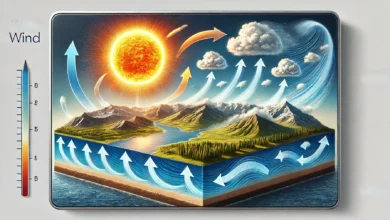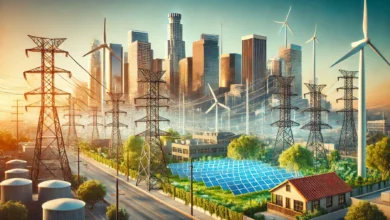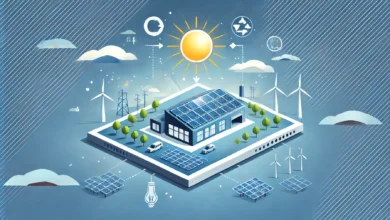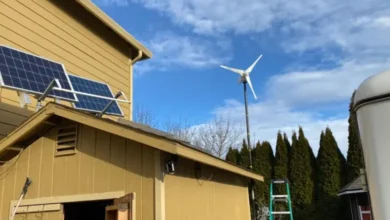Power Outages in Houston: Causes, Impacts, and Solutions
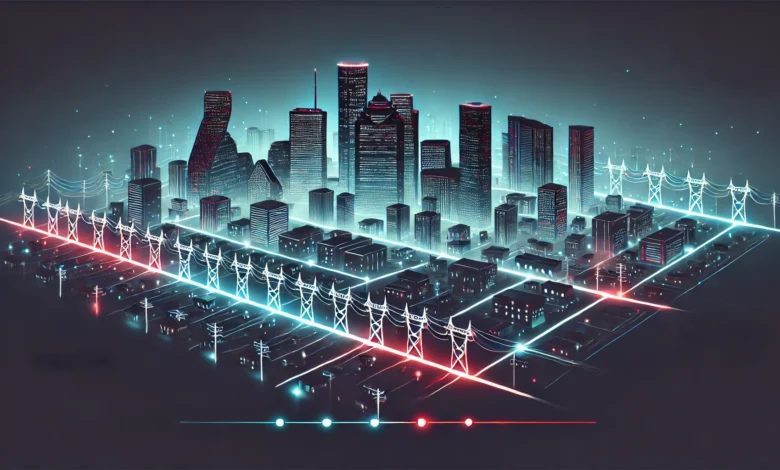
Electricity is a vital part of our daily lives, and power outages in Houston can disrupt routines, affect businesses, and pose safety risks. In this article, we’ll explore the common causes of power outages, their impacts, and how to stay prepared.
Contents
- 1 What Causes Power Outages in Houston?
- 2 How Do Power Outages Impact Houston Residents?
- 3 The Importance of Staying Informed
- 4 Solutions and Future Perspectives
What Causes Power Outages in Houston?
Houston, being a large and weather-prone city, experiences power outages for a variety of reasons. Here are the most common causes:
1. Severe Weather Conditions
- Storms: Hurricanes, thunderstorms, and high winds often knock down power lines.
- Heatwaves: Excessive heat leads to increased energy demand, overloading the grid.
- Freezing Temperatures: Events like Winter Storm Uri in 2021 caused ice accumulation on power lines and widespread grid failures.
2. Equipment Failures
Aging infrastructure in some parts of Houston can result in unexpected power outages due to equipment malfunctions.
3. Human Activities
- Construction accidents can damage power lines.
- Planned maintenance can also cause temporary outages, though these are often announced in advance.
How Do Power Outages Impact Houston Residents?
The effects of power outages in Houston can be significant, affecting individuals, businesses, and public infrastructure.
1. Residential Impacts
- Loss of air conditioning during summer heatwaves.
- Spoiled food due to non-functioning refrigerators.
- Limited access to critical medical equipment for those relying on electricity.
2. Business Disruptions
- Halted operations lead to financial losses.
- Data loss or server downtime in industries relying on technology.
3. Public Safety Risks
- Traffic lights failing, leading to road hazards.
- Increased crime rates in darkened neighborhoods.
How to Stay Prepared for Power Outages in Houston
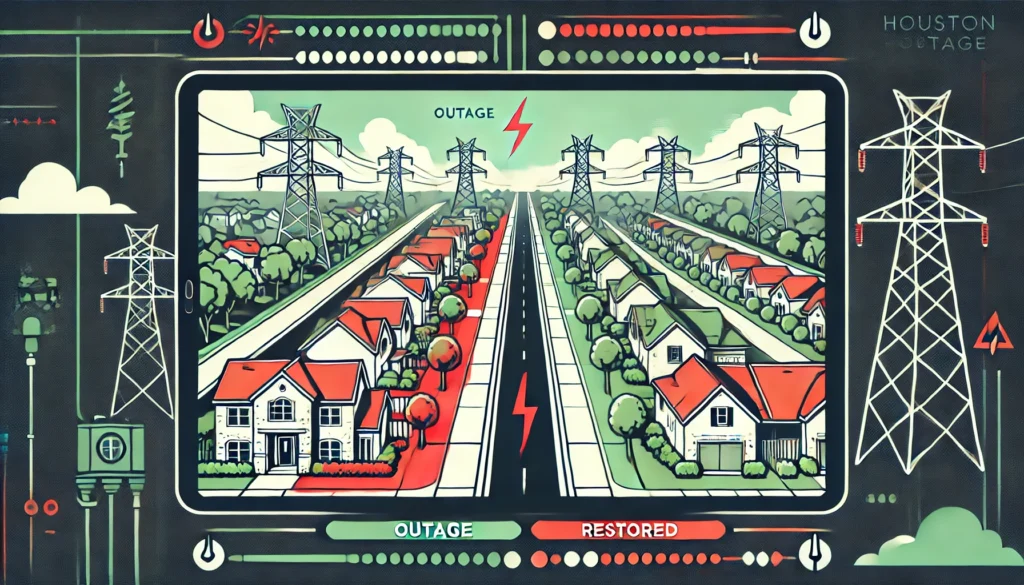
Being prepared is crucial to minimizing the disruption caused by power outages in Houston. Here’s a detailed guide to help you stay ready:
1. Use Power Outage Maps
Platforms like CenterPoint Energy’s outage map offer real-time updates, allowing you to:
- Track outages in your area.
- Monitor restoration efforts and estimated repair times.
- Report outages directly to the provider if not already logged.
Utilizing these tools ensures you stay informed about the situation and plan accordingly.
2. Create an Emergency Kit
A well-stocked emergency kit is essential during outages. Here’s what your kit should include:
- Flashlights and Batteries: To provide reliable lighting in the absence of electricity.
- Non-Perishable Food and Water: Enough to last at least 72 hours for your household.
- Backup Chargers or Power Banks: Keep your devices charged to maintain communication and access important updates.
- First Aid Kit: For handling minor injuries during emergencies.
- Portable Radio: To stay updated on news and weather alerts.
- Warm Clothing and Blankets: Essential during winter outages to keep warm.
Organizing these items in a dedicated kit will ensure quick access when needed.
3. Invest in Backup Power
Backup power solutions can provide a reliable safety net during extended outages. Options include:
- Portable Generators: Affordable and ideal for running essential devices like refrigerators and medical equipment.
- Whole-House Generators: A more comprehensive solution for powering your entire home during outages.
- Battery Storage Systems: Environmentally friendly options that store excess energy, especially useful if combined with solar panels.
Ensure generators are used outdoors and away from windows to prevent carbon monoxide poisoning.
Reducing the Frequency of Power Outages
While individual preparedness is important, collective efforts by residents and policymakers can significantly reduce the occurrence of power outages in Houston. Here are some actionable steps:
1. Infrastructure Modernization
Investing in updated equipment and advanced technologies is key to improving grid reliability:
- Replacing Aging Equipment: Old transformers and power lines are more prone to failure; upgrading them ensures a more robust system.
- Smart Grid Technology: Implementing smart grids enables real-time monitoring and faster response to outages, reducing their duration and impact.
- Underground Power Lines: Where feasible, transitioning overhead power lines underground protects them from storm damage.
Modernizing infrastructure creates a resilient power system capable of handling increasing demands.
2. Renewable Energy Solutions
Incorporating renewable energy sources into the grid reduces dependency on traditional systems and offers numerous benefits:
- Solar Power: Decentralized solar installations can continue to provide electricity even when the grid fails.
- Wind Energy: A sustainable and reliable alternative, especially during peak demand.
- Energy Storage Systems: Pairing renewable energy with batteries ensures uninterrupted power supply during outages.
Expanding renewable energy use not only stabilizes the energy supply but also promotes a cleaner and more sustainable environment.
By combining personal preparation with long-term investments in infrastructure and renewable energy, Houston can build a more resilient energy system, minimizing the impact of outages on residents and businesses alike.
The Importance of Staying Informed
During power outages in Houston, staying informed is crucial. Check real-time updates through official sources, and always follow local emergency guidelines to stay safe.
Houston faces unique challenges with its power grid, but with the right strategies and preparations, the impacts of outages can be minimized.
Solutions and Future Perspectives
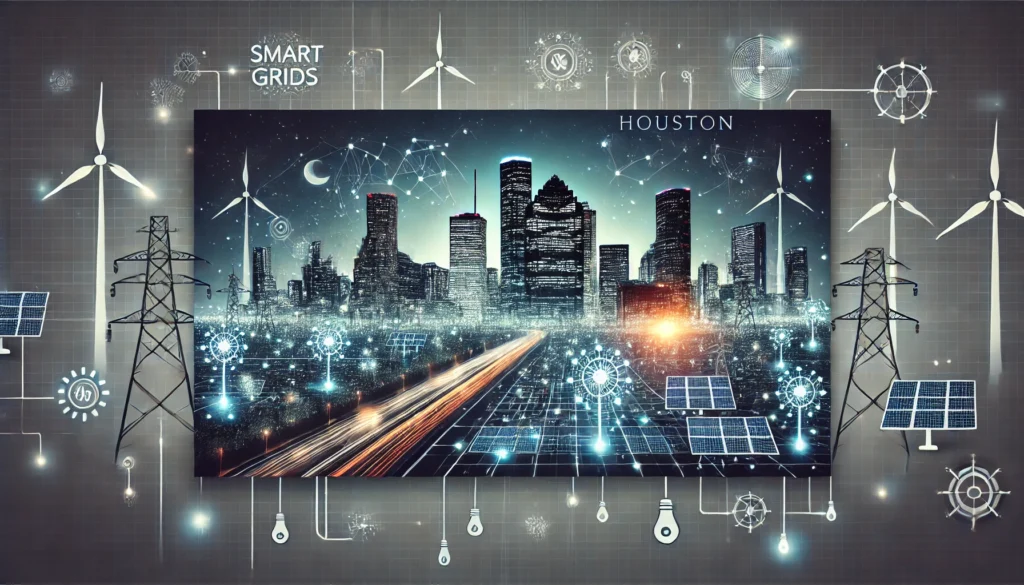
As Houston continues to experience power outages due to various factors, implementing forward-thinking solutions and investments in modern energy systems is crucial. Here are some key areas that can help reduce the frequency and impact of outages:
1. Smart Grids: The Role of Intelligent Energy Systems
Smart grids are advanced energy systems that use digital technology to monitor and manage the flow of electricity more efficiently. In Houston, smart grids could:
- Enhance Reliability: Quickly detect and isolate issues in the power grid to minimize widespread outages.
- Improve Energy Distribution: Optimize energy flow to meet demand during peak usage times, especially during heatwaves.
- Integrate Renewable Energy: Facilitate the use of solar and wind energy by efficiently distributing generated power.
2. Renewable Energy: Reducing Outage Risks
Investing in renewable energy sources like solar and wind can significantly reduce the dependency on traditional power grids, which are often prone to failures. For Houston, this means:
- Diverse Energy Sources: Ensuring a balanced energy mix to prevent system overload.
- Sustainability: Providing a cleaner and more sustainable energy solution for the growing population.
- Resilience: Offering decentralized energy production that can continue to function even during grid failures.
3. Policies and Investments: Modernizing Houston’s Power Infrastructure
To address recurring outages, policymakers and energy companies in Houston must prioritize:
- Infrastructure Upgrades: Replacing aging equipment with modern technology to handle growing energy demands.
- Energy Storage Solutions: Investing in battery storage systems to retain excess energy and release it during outages.
- Community Initiatives: Educating residents on energy conservation and the benefits of renewable energy adoption.
- Government Support: Allocating funds and incentives for the adoption of smart grids and renewable energy projects.
By focusing on these innovative approaches, Houston can build a more resilient energy system that minimizes outages and ensures a sustainable energy future for its residents. Incorporating smart technology, renewable energy, and comprehensive policy changes will play a vital role in achieving this goal.
